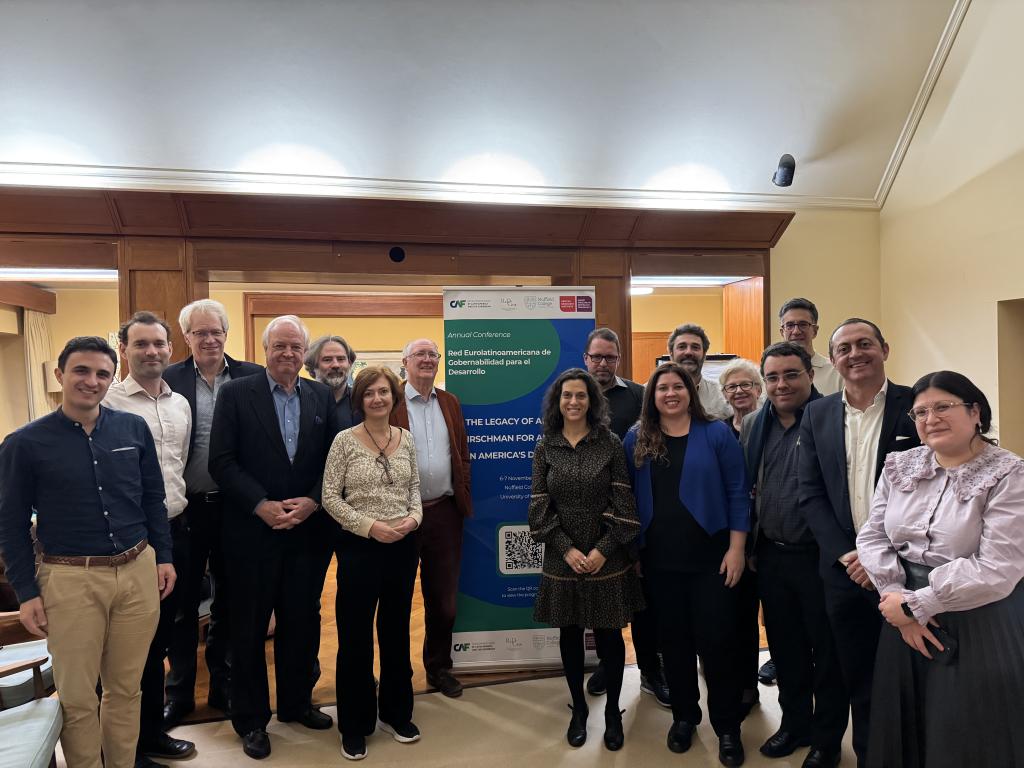On November 6 and 7 took place the Annual Conference of the Red Eurolatinoamericana de Gobernabilidad para el Desarrollo (RedGob) at Nuffield College, University of Oxford devoted to expore the Albert Hirschman’s legacy to understand and promote development.
Launched on November 29, 2003 in Barcelona the RedGob’s primary motivation was to create a space for reflection and debate on the issues of gobernability, public policy and development in Latin America and the Caribbean by contrasting and comparing the experiences of Europe and Latin America as a process of mutual learning. The founding members include the Instituto Internacional de Gobernabilidad de Cataluña, the Institut für Iberoamerika-Kunde (which changed the name to GIGA), the Nuffield College at the University of Oxford, the Institute for Political Studies in Paris (Sciences Po), and the University of Salamanca as well as the European mission of the IDB. Currently there are more members from latin America countries such as FLACSO Ecuador, Cieps (Panamá), Universidad del Pacífico (Perú) and University of San Martín (Argentina) and the network has the support of CAF (Corporación Andina de Fomento) and IDEA International. The event in Oxford gave continuity to a first workshop hosted by the Albert Hirschman Democracy Centre in February 2024.
Six panels were organised on the topics “Rethinking Hirschman’s reform-mongering model and reformers” (panel 1), “Revisiting Hirschman’s ‘Exit, Voice, and Loyalty’” (panel 2), “Hirschman on institutional challenges” (panel 3), “Review of Hirschman’s further ideas on development, growth and inequality” (panel 4), “Understanding great power competition and the public sphere through Hirschman’s concepts” (panel 5) and “Statecraft and Economic Cooperation” (panel 6). Among presenters were Andrés M. Guiot-Isaac (London School of Economics), Eduardo Dargent (Pontificia Universidad Católica del Perú), Carlos Elizondo (Escuela de Gobierno del Tec de Monterrey), Bert Hoffmann (German Institute for Global and Area Studies-GIGA), Maria Varaki (King’s College London), Jacqueline Behrend (Pro Tempore Vice President of RedGob, National University of San Martín, CONICET), Yanina Welp (AHDC, Graduate Institute), Paola Fajardo-Heyward (World Bank), Jose Antonio Cuesta Leiva (World Bank), Paul Segal (King’s College London), Santiago Gerchunoff (Universidad Carlos III de Madrid), Jorge Heine (Boston University), Etel Solingen (University of California Irvine), Lourdes Sola (Universidade de São Paulo); and Sergio R. Vale (Universidade de São Paulo).
Among others, Carolina Guerrero (German Institute for Global and Area Studies-GIGA), Andrew Thompson (Professorial Fellow, Nuffield College) and Leiv Marsteintredet (University of Bergen), Michael Best (Professor Emeritus, University of Massachusetts Lowell), Vinícius Rodrigues Vieira (Armando Alvares Penteado Foundation), Desmond King (Professorial Fellow, Nuffield College) had an active role providing comments to the presentations.
A closing roundtable chaired by Laurence Whitehead (Nuffield College, University of Oxford) and with the participation of Antonio Ramsés Morales (CAF) and Christian Asinelli (Corporate Vice-President of Strategic Programming, CAF) focused on challenges to promote development within the goals of social and environmental justice.
The event proved once again the vibrant legacy of Albert Hirschman’s thoughts to think and face the challenges faced by countries in Latin America and beyond.


